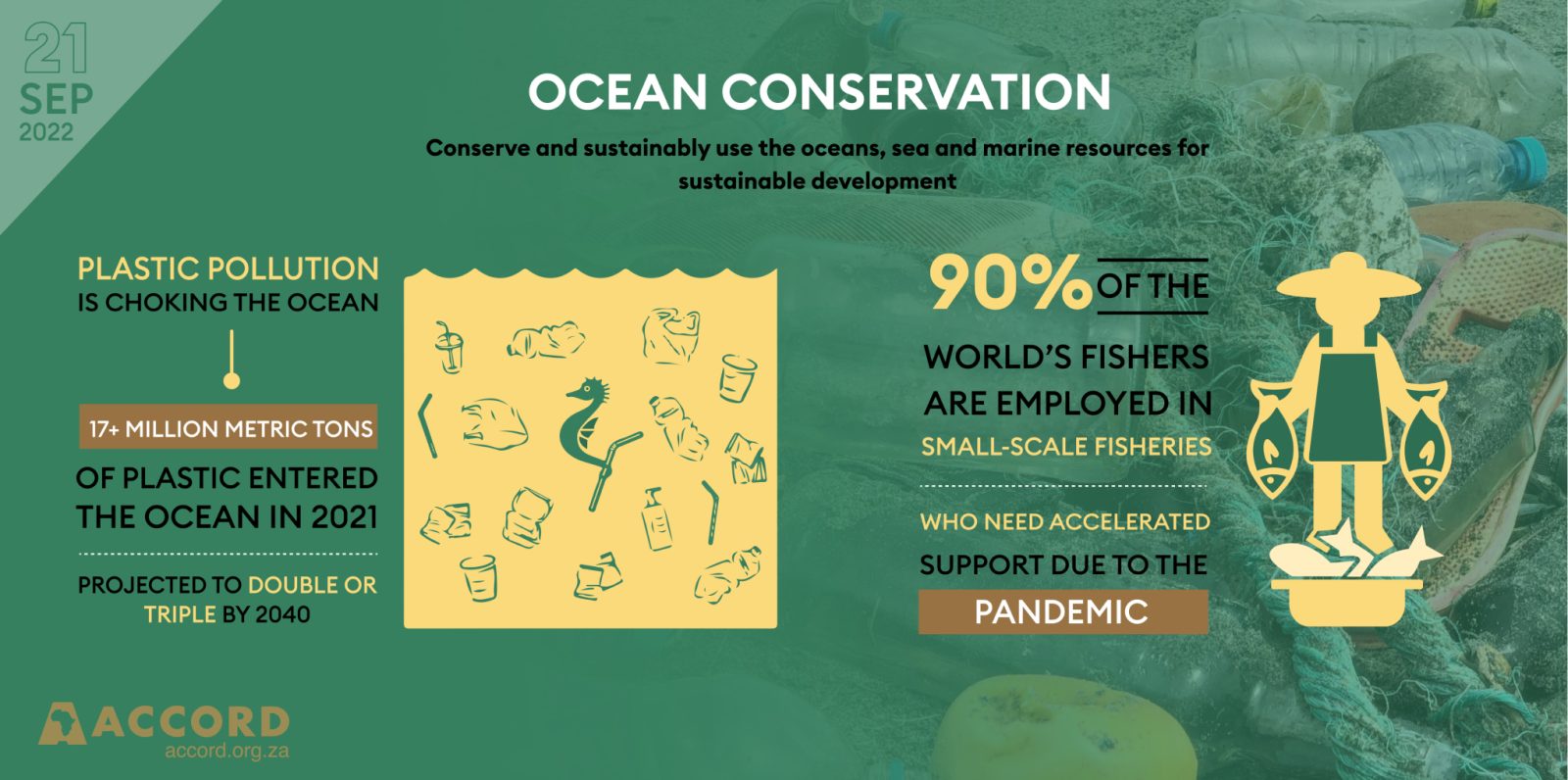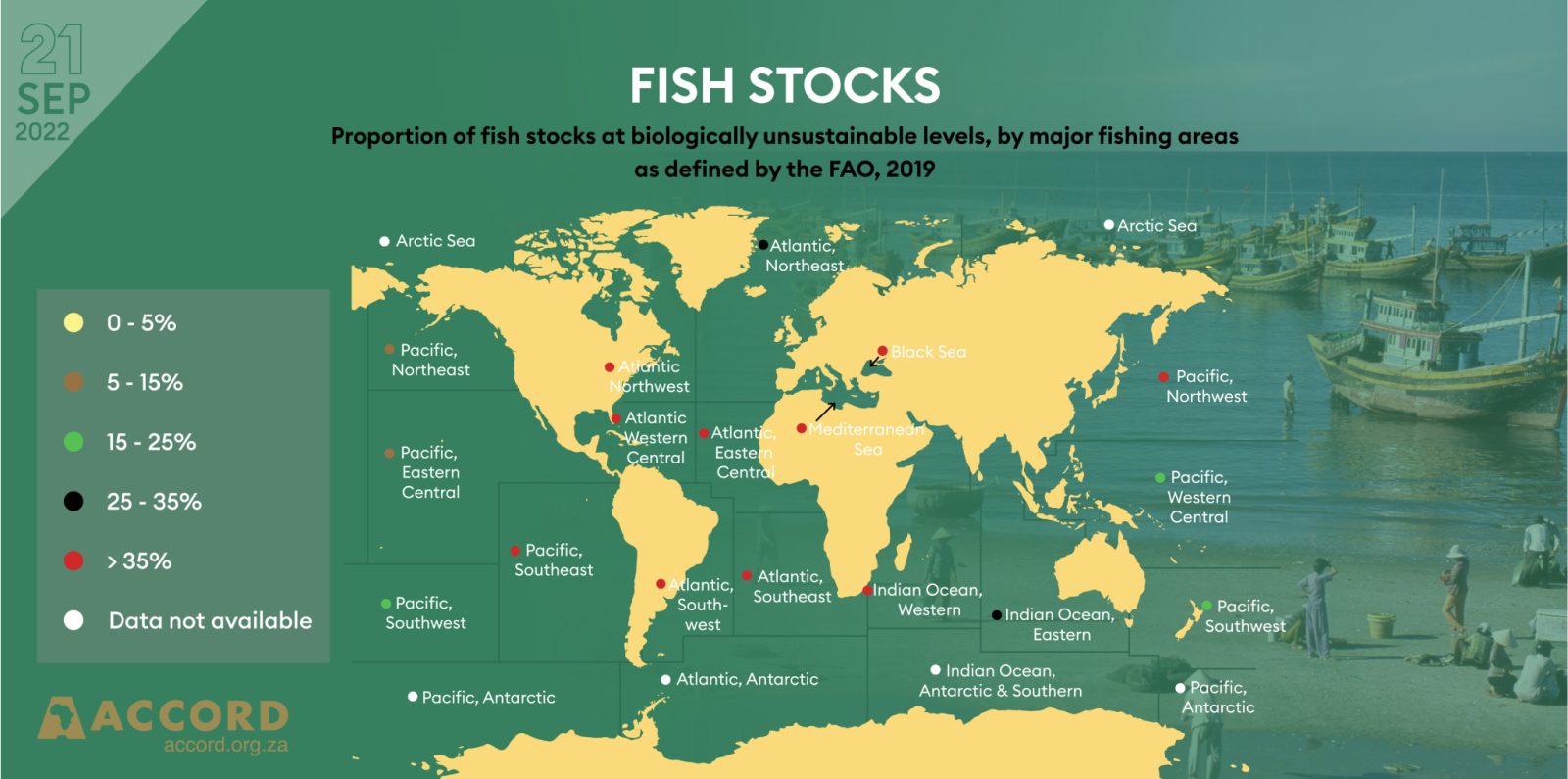The dependence of African States on marine fisheries resources may render the continent particularly exposed to conflict, food insecurity and economic instability due to regulatory gaps and failures in fisheries. Regulatory voids in African fisheries governance may cause conflict among right-holders, destructive economic activities, and crime, with compounding and cascading effects on the continent’s security risk exposure. Greater awareness and understanding of how different forms of regulatory failures and gaps in fisheries governance lead to security threats may assist African States when developing national maritime security strategies.

Credit: UN Sustainable Development goals report 2022
Africa’s valuable fisheries resources and the economic sector attached to it is an important contributor to food security, livelihoods, and economic prosperity on the continent. However, fish stocks are under pressure both in Africa and worldwide due to factors such as overfishing, climate change and habitat destruction. The environmental security exposure is compounded by weaknesses in the governance frameworks designed to regulate resource extraction, partly a consequence of the resource itself being about as diverse, intricate, and dynamic in nature as the economic sector surrounding it. The theory of regulatory voids, i.e., regulatory failures and gaps caused by lack of knowledge, lack of institutional skills and resources, as well as political disagreement about the nature of the problem, may assist with explaining the various causes and manifestation of security risk exposure from fisheries resources extraction. Coupled with resource scarcity, the regulatory voids of weak fisheries governance frameworks may leave gaps that can easily fuel conflict and illicit activities with compounding and cascading effects. This makes African fisheries a global security concern and one of the priority areas of the 2050 African Integrated Maritime Strategy.
Marine fisheries is an important resource for Africa, which means that conflict, food insecurity and economic instability that threaten the fisheries is an important security concern for Africa
Tweet
African exposure to security risks from fisheries
The coastal waters of Africa’s 38 coastal states are hosts to some of the richest fishing grounds in the world. Marine capture fisheries are regarded as indispensable to the African blue economy and the food security of a growing African population. A 2014 FAO-NEPAD study suggested that African fisheries secured the livelihood of some 13 million African fishers and fish processing workers (inland fisheries included) and contributed USD 24 billion (or 1.26 percent) to the continents’ total GDP. The African population is highly reliant on fish as a major share of animal proteins in its diet, with fish feeding an estimated 200 million people across the continent. Yet, while the African marine capture fisheries production is steadily increasing, the overall trend is that African fish stocks are in decline, and in some places severely overfished, exposing African countries to the security risks associated with food scarcity and economic instability.
More effective fisheries management may improve the sustainability of the resource and the African fisheries sector. Yet, despite considerable efforts, weak fisheries governance seems to be endemic both in Africa and most of the rest of the world, challenged by both the difficulty of regulating capture fisheries at a sustainable level and the actors’ level of compliance. The backdrop is a highly complex economic sector consisting of actors ranging from the artisanal and small-scale to multinational entities with billion-dollar turnover. These fishers harvest a diverse range of fish species in different areas and seasons while using an equally diverse range of fishing techniques and tools. Like the resource they rely on, fishers are often highly adaptive to their environment and form part of an intricate ecosystem of economic actors in a larger value chain from harvesting, to transport, production and trade of fish and fish products both at sea and on land. For regulators, a further complicating factor is that these ecosystems tend to cross socio-political boundaries such as maritime zones and national borders. The complexity of fisheries governance both in Africa and elsewhere seems to lend itself to cascading and compounding regulatory failures and gaps, which trigger exposure to not only conflict over resources, but also potentially destabilising forms of economic and resource exploitation and crime.
Manifestations of risk
In the maritime security literature African exposure to security risk in fisheries is known to manifest itself through either (a) violent conflict between perceived right-holders; (b) destructive economic activities; and/or (c) white-collar and organised crime.
Marine fisheries resources are part of the commons. When assigning rights to common resources, fisheries governance frameworks set criteria that may tend to favour certain actors above others. Regulatory voids caused by institutions that either fail or lack the legitimacy to allocate rights over shared resources are known to give rise to competing claims among perceived right-holders. There are more than 40 examples of competing claims over fisheries resources giving rise to violent conflict internationally, as illustrated by the cod wars between UK and Iceland and, closer to home, the unresolved boundary dispute between UK, Mauritius and Maldives concerning the Chagos Archipelago. However, conflicts also erupt at the national and local level, typically in the form of disputes between competing segments of the sector over access to fisheries resources, such as between artisanal or small-scale fishers and commercial or industrial fishing fleets or between national and foreign fishing interests. Changes brought about by climate change, which may affect the distribution of commercial fish stocks, as well as shifting socioeconomic and political priorities, is likely to challenge rights-holders under existing fisheries governance frameworks and remain a source of conflict also in the future.

Credit: UN Sustainable Development goals report 2022
Regulatory voids are also known to facilitate destructive economic activities which harm the resources and efforts of responsible resource management. The competitiveness of law-abiding actors is also affected. Researchers estimate that African legitimate businesses suffer a gross revenue loss to illicit fish trade of as much as USD 5.3 billion annually. All segments of the sector are complicit, pertinent examples being dynamite fishing in small-scale fisheries and fishing beyond quota by both national and foreign fishing companies. While destructive economic activities in small-scale fisheries can cause security risk exposure, regulatory voids become evident as institutions battle to strike a balance between compliance measures aimed at small- and large-scale fisheries respectively, either by failing to prioritise security risks, misapplying law enforcement tools, or misjudging the perceived security threat altogether. On the other hand, large-scale economic actors are taking advantage of the regulatory gap that flow from certain (including some African) flag States being unable or unwilling to keep an accessible record of owners, identities and movements of distant water fishing vessels and to exercise due diligence to ensure these fleet operators’ compliance with local fisheries management rules. These flag States place African law enforcement institutions at a severe disadvantage when attempting to monitor, control and investigate foreign fishing activities, and which distant water fishing operators in turn exploit to undertake illegal, unreported or unregulated (IUU) fishing activities in African waters.
Greater awareness of regulatory failures and gaps in fisheries governance may assist African States when developing national maritime security strategies
Tweet
Finally, regulatory voids in fisheries governance frameworks seem to be criminogenic in the sense that they facilitate and attract crime. For instance, the lack of institutional capacity among law enforcement agencies may facilitate corporate crime as part of the otherwise legitimate business operation of fishing companies. Yet, regulatory failure in African fisheries governance also takes the form of potentially destabilising state-corporate crime, which could explain the region’s high risk of professional white-collar fisheries crime including illegal fishing, labour exploitation, and access to fisheries resources by means of bribes and corruption. Although some researchers may caution about the nuances at play, regulatory gaps in fisheries are known to attract and facilitate organised crime, particularly trafficking in illicit drugs, with well-known examples being the barter of methamphetamines for abalone or the use of fishing vessels as part of the trafficking route, as well as organised crime groups involved in human trafficking for the purpose of forced labour.
Eve de Coning (LLB, LLM (UCT)) is a Research Fellow with the Security Institute for Governance and Leadership in Africa (SIGLA) at the University of Stellenbosch. This paper is based on a policy brief published by SICGLA as Research Brief 7/2022 and is available here: http://www.sun.ac.za/english/faculty/milscience/sigla/Pages/Research-Briefs-2022.aspx


